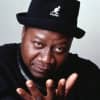Ghana-based Benjamin Lebrave speaks fluent French and English, and can schmooze in Spanish and Portuguese. He’ll report on new African music every other week. This week, it’s Congolese rapper Didjak Munya.
Congolese music is the best. Or to phrase it slightly more diplomatically: Congolese music is the best dance music in the world. I don't think anything comes close to the way the Congolese lay their guitars on top of rumba beats. Listen to mid-1970s Zaïko Langa-Langa, and realize deep house was already around. Listen to Didjak Munya, and realize you have been missing out.
Download: Didjak Munya f. Marciano, "Mukusa"
Didjak is a rapper at first, but he incorporates a lot of different influences into his music, in particular plenty of ndombolo, which I am a total sucker for. So I went bananas when I first heard his track "Mukusa"—cheers to Daferwa for pointing me to it. As is often the case, Didjak didn't come up with his style off the bat, he has been around for quite some time, and refined his approach over the years.
"At first I wanted to dance," he says. "I wanted to dance like Michael Jackson, but I wasn't born with the gift of dancing." So instead Didjak took to writing verses at home, in the rough Synkin Makelele neighborhood of Bandalungwa, one of the more populous districts of Kinshasa. One day his friends dared Didjak to go up to one of the neighborhood hip-hop groups and spit a verse for them. The intimidated 13-year-old faced the challenge, and impressed the group so much that they asked him to join them. Didjak was younger than them, but they all realized he was bringing a different ingredient to the table. Didjak's originality helped him rise to become the leader of the group, then a year and a half into it, as jealously grew on all sides, he decided to leave.
This is when he met Elie les Anges, a legend among Kinshasa hip-hop heads. In the late 1990s, Elie was putting together massive hip-hop concerts, featuring up-and-coming artists from all over Kinshasa, reaching deep into its most remote areas. From 9PM till the early morning, Elie would allow young talents to perform one or two songs each—imagine how many groups would perform!
After Elie, Didjak started his own group, Bulgeur Fly, with which he won a Kinshasa-wide rap contest in 1998. The prize was a a 10-track album and music video, which never came. So Didjak continued his struggle, performing as much as possible into the mid-2000s with his new group now called Munya—"sun" in Tshiluba, one of the four national languages of the DR Congo. In 2004 they released the song Munya Wetu ("Our Sun"), which incorporated elements of Tshiluba folklore. The song caught everybody's attention, to the point where munya became a new reference: any artist mixing any kind of tradition into their music were said to "sound like munya."
As Didjak became known for his hybrid style, he also found better opportunities: in the 2000s he continued to perform a lot, often opening for major Congolese artists, and by 2009 he managed to release his first album, Code Rouge, which features Congolese legend Papa Wemba.
His follow-up, Oxygène, has been in the works ever since. But doing everything alone takes time. Normally in Kinshasa, artists rely on shout-outs to make money: it's not uncommon for a popular ndombolo song to mention over 150 names. Depending on the artist, people will pay thousands of dollars, sometimes up to $15,000, to have their name sung or praised in a popular song.
Didjak has one Tschiluba inspired song on his album where he thanks a handful of people who have helped him along the way, but his album is essentially self-funded, the fruit of years of stashing a few Congolese francs after each gig. "There are no proper managers or producers in Kinshasa, so I have to do everything alone." And considering how diverse and specific his musical taste is, I can imagine how much labor is required. Didjak has collaborated with other legendary Congolese musicians, such as Lokua Kwanza, and Bill Clinton Kalonji, from Werrason's orchestra.
With "Mukusa," Didjak was awarded hip-hop artist of the year at the prestigious Okapi awards. I have yet to hear most of the album, but based on what I've heard so far, and what Didjak has been telling me, we're in for an avalanche of Congolese goodness.
